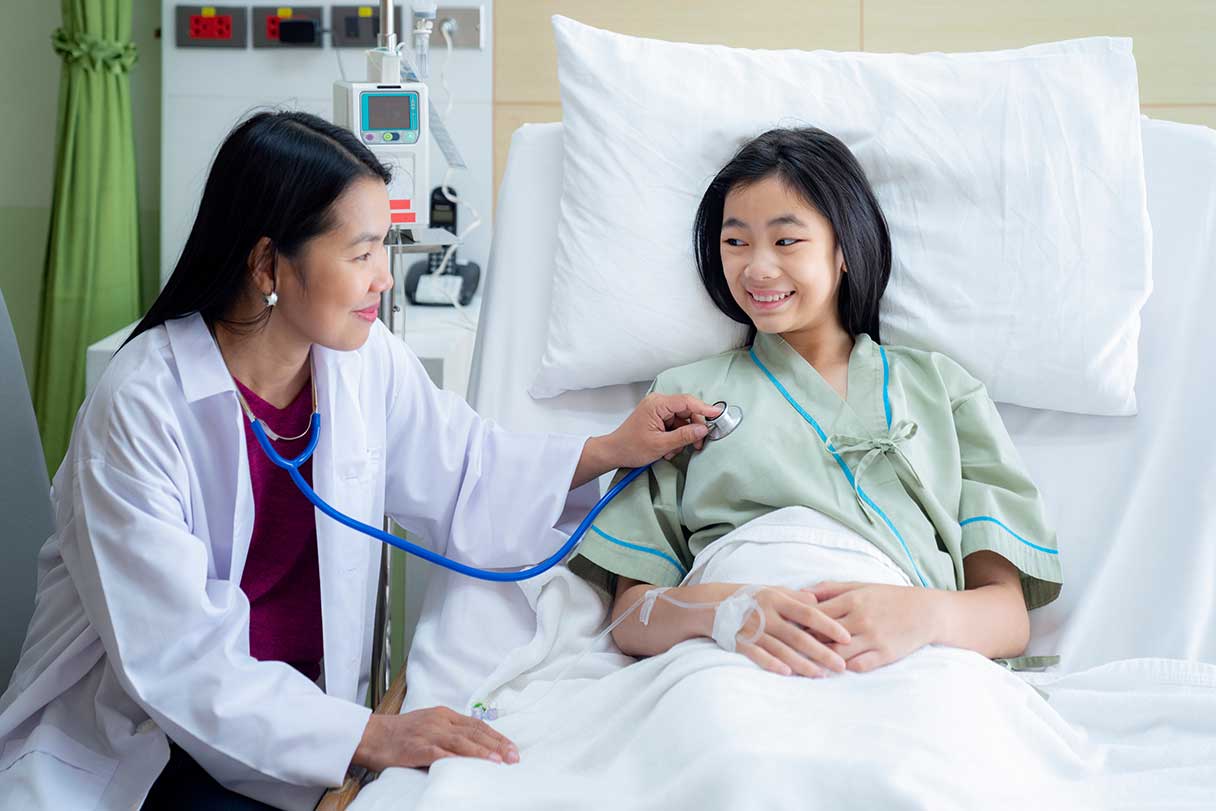If you have celebrated your 45th birthday, it's not just another age milestone to check off — it's also time to schedule your first colonoscopy. Getting a routine colonoscopy is important because colorectal cancer is the third-leading cause of cancer-related deaths in the United States.1 Read on to learn all about colonoscopies, including how to prepare for a colonoscopy, tips for recovery and more.
What Is a Colonoscopy?
A colonoscopy is a procedure that allows a gastroenterologist to see inside your large intestine (colon) and rectum. The doctor is looking for swollen or irritated tissue, polyps or signs of cancer. If the doctor finds anything concerning, they may take a biopsy (tissue sample) or remove the polyp(s) or irritated tissue.2
How Much Does a Colonoscopy Cost?
According to the American Cancer Society, there should be no out-of-pocket costs for a routine colonoscopy procedure; however, if your doctor does have to take a biopsy or remove tissue/a polyp, it becomes a diagnostic colonoscopy and your insurance may or may not cover it. Call your insurance to double-check before your procedure.3
The average cost of a colonoscopy is $2,750, but the total can range from $1,250 to $4,800, depending on where you live, where you have the procedure performed and what your insurance covers (if you have insurance). For example, outpatient centers may be cheaper than an inpatient facility like a hospital. If you do have health insurance, make sure all of the providers that will be used are in-network, including the anesthesiologist. Other factors that influence the cost include any prescriptions your doctor might recommend, like a sedative or painkiller, and any follow-up appointments needed. These appointments may or may not be included in the cost of the procedure.4
Recommended Age for a Colonoscopy
For those with an average risk of colorectal cancer, it is recommended that men and women aged 45 or older get colorectal screenings every 10 years.2
Your doctor may suggest starting sooner or getting a colonoscopy more frequently if you have certain risk factors, including:
- Family history of colorectal cancer
- Existing inflammatory bowel diseases (such as Crohn's disease or ulcerative colitis)
- Previous radiation treatments to treat cancer in the stomach or pelvic area
- Suspected or confirmed hereditary colorectal cancer syndrome (i.e., familial adenomatous polyposis or Lynch syndrome)
- Lifestyle factors (smoking, obesity, poor diet, etc.)5
Routine colonoscopies are usually recommended until 75 years of age.5
How to Prepare for a Colonoscopy
Many doctors suggest scheduling your colonoscopy for earlier in the day. While the procedure typically takes just 30 to 60 minutes, if you have a traditional colonoscopy, you will be heavily sedated or put under anesthesia, so you will need time to recover.1 It's also been shown that colonoscopies done in the morning lead to more accurate results.6
Because of the preparation required for a colonoscopy, you may want to take off work for both the prep day and the procedure day.
Colonoscopy prep diet
Your doctor will give you full instructions ahead of your procedure, but the important thing is that your colon needs to be completely clear and clean.
Your doctor may suggest that you change your diet leading up to the procedure. Generally, it is recommended to eat less fiber in the days before your colonoscopy, which means you should not eat the following types of food:
- Whole grains
- Nuts
- Seeds
- Dried fruit
- Raw fruits
- Vegetables
The day before a colonoscopy you won't be allowed to eat solid foods, so stock up on clear liquids, such as:7
- Clear broth or bouillon
- Black coffee or tea
- Clear juice (apple or white grape)
- Jell-O or popsicles
Colonoscopy prep kits
The day or afternoon before, you'll start the colonoscopy prep kit. You may have heard about the liquids involved and how they don't taste very good, but flavors have improved over the years and your doctor may have some tips for how to make it go down easier (e.g., drink it cold, through a straw).
There are two types of colonoscopy or bowel prep kits, both containing oral laxatives, just with different ingredients. The most important thing is to complete the entire prep kit even if your stool is clear or light yellow; your colon needs to be clear so that the doctor can easily see everything and take an accurate biopsy if needed.8
What Happens During a Colonoscopy?
A colonoscopy procedure typically takes 30 to 60 minutes and you'll be heavily sedated or put under anesthesia. The doctor may also give you pain medication to ease any potential discomfort.
From there, you will lay on your side on the exam table and the doctor will insert a scope in your rectum. The scope has a light, camera and tube that allows the doctor to pump air, water or carbon dioxide into your colon, depending on what needs to be done to make it easier to see. Instruments can also be inserted into the tube if a biopsy needs to be done or a polyp removed.
If you are awake, you may feel the urge to have a bowel movement or experience some cramping when the scope is inserted.2
Virtual colonoscopies
During a virtual colonoscopy, instead of inserting a scope, a CT scan is used to take hundreds of images of your abdominal organs, including your colon and rectum.
The preparation for a virtual colonoscopy is the same, and you'll still have air or carbon dioxide inserted into your colon to make it easier to see your organs. That being said, this option is much less invasive and can also detect abnormalities in other organs.
Virtual colonoscopies may be a good option for those who have an average risk of colon cancer, can't or don't want to be sedated, are at risk for colonoscopy complications or have a bowel obstruction.9
Colonoscopy Recovery
Following a colonoscopy procedure, it takes about an hour for the sedative to wear off, but you won't be able to drive home and you shouldn't go back to work afterward. You may feel bloated and gassy after the procedure, but that's normal; walking around may help.
When you have your first bowel movement, you may see a little bit of blood, which is also normal. If you continue to see blood in your stool or you are concerned, always reach out to your doctor.2
If your colonoscopy result is negative and the doctor doesn't find any abnormalities, you probably won't need another colonoscopy for 10 years. If the doctor finds polyps or you have risk factors, they may suggest your next colonoscopy within one to seven years.2
Side Effects of a Colonoscopy
There are a few potential side effects of a traditional colonoscopy:
- Reaction to the sedative/anesthesia
- Tear (perforation) in the colon or rectum wall
- Bleeding from where the biopsy, polyp or tissue was taken
- Potentially excessive bleeding if your blood doesn't clot normally2
Potential side effects of a virtual colonoscopy include:
- Tear (perforation) in the colon or rectum wall (the colon and rectum are still filled with air or carbon dioxide for this test)
- Exposure to a low level of radiation9
What Should I Eat After a Colonoscopy?
After a colonoscopy, you'll want to ease back into eating foods that will be gentle on your digestive system. Avoid alcohol, spicy foods, high-fiber foods, hard-to-digest meat and heavy, greasy meals.
Your doctor can give you a specific list, but stock up on things like electrolyte drinks, fruit/vegetable juice, tea, saltine crackers, soup, applesauce, eggs, yogurt, Jell-O, popsicles, pudding, mashed potatoes, white bread, etc.10
CareCredit Financing for Colonoscopy Procedures
If your colonoscopy procedure is not fully covered by insurance and you are looking for an option to help manage your medical bills, consider healthcare financing with the CareCredit credit card. The CareCredit card can help you pay for the care you want and need and make payments easy to manage.* Apply today and use our Acceptance Locator to find a provider near you that accepts CareCredit. Continue your wellness journey by downloading the CareCredit Mobile App to manage your account, find a provider on the go, and easily access the Well U hub for more great articles, podcasts, and videos.
Author Bio
Abbie Mood is a freelance writer with more than 10 years of experience. She has worked with clients of all sizes to create compelling content and she has written for the American Kennel Club, Marriott Bonvoy, Women's Health Online, Headspace, and more.








